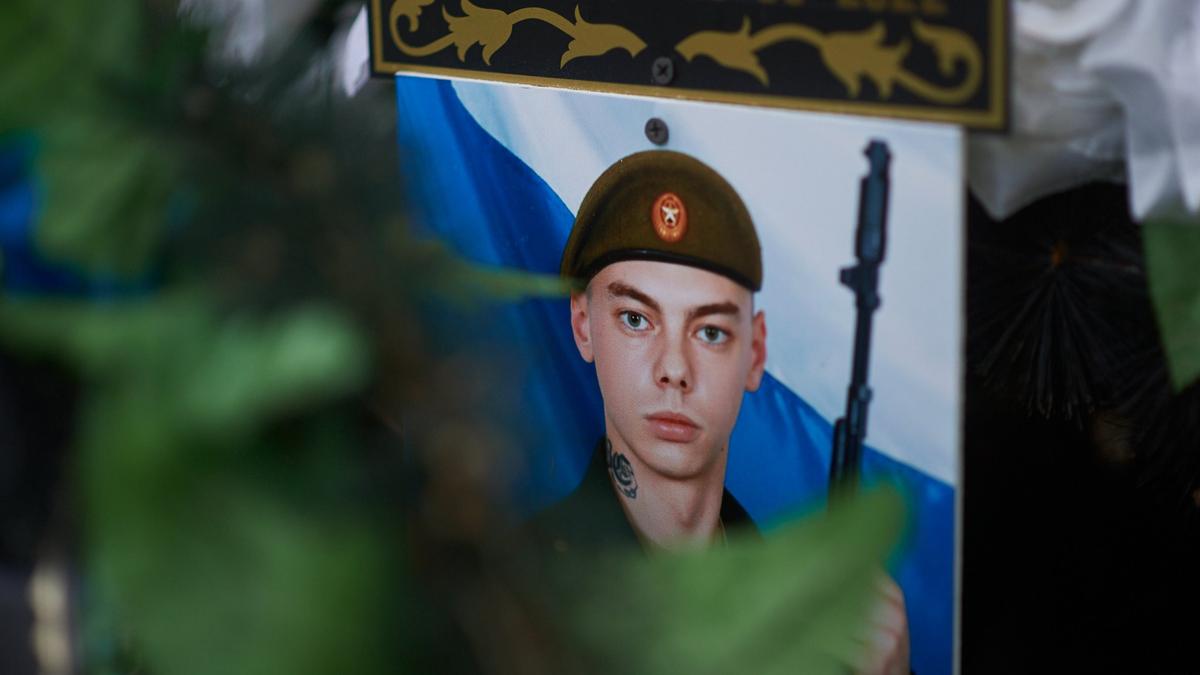“I didn’t have any more doubts that it was Andrey in the coffin. His things were returned to me. But how do you say goodbye through a coffin lined with zinc?.. We took a can opener, then used it to make a little window in the coffin. There was no smell, the colour of his skin was the same as always. As if he were asleep. Only his mouth was skewed, as if it was frozen mid-scream. My son was in pain, dying, screaming, calling for help.”
The text was prepared jointly with the Novaya Vkladka
The funeral
On 9 April, an unusual number of people gathered in the village Vsesvyatskaya of the Russian Perm region. Government and military officials as well as Cossacks arrived from the district centre. The village community centre saw people say goodbye to the local hero of the “special operation”, killed in the village Kamianka of the Izium district, in the Kharkiv region of Ukraine. Shifting from foot to foot in the melted snow, the crowd flowed from the street to the centre and back. In the main hall of the community centre, near the closed red coffin, an honour guard stood at attention — these soldiers were as young as the deceased. From a portrait covered with a black ribbon, the whispering fellow villagers and an array of strangers were being watched by the big and seemingly surprised eyes of the 19-year-old Andrey Fomintsev.
“Our compatriot was killed while eliminating Nazists on Ukrainian territory. Thanks to your son, our lands will never be attacked by the enemy. And young people, seeing his heroic deed, will be ready to defend our homeland,” said the head of the Chusovoy district of the Perm region to the crowd.
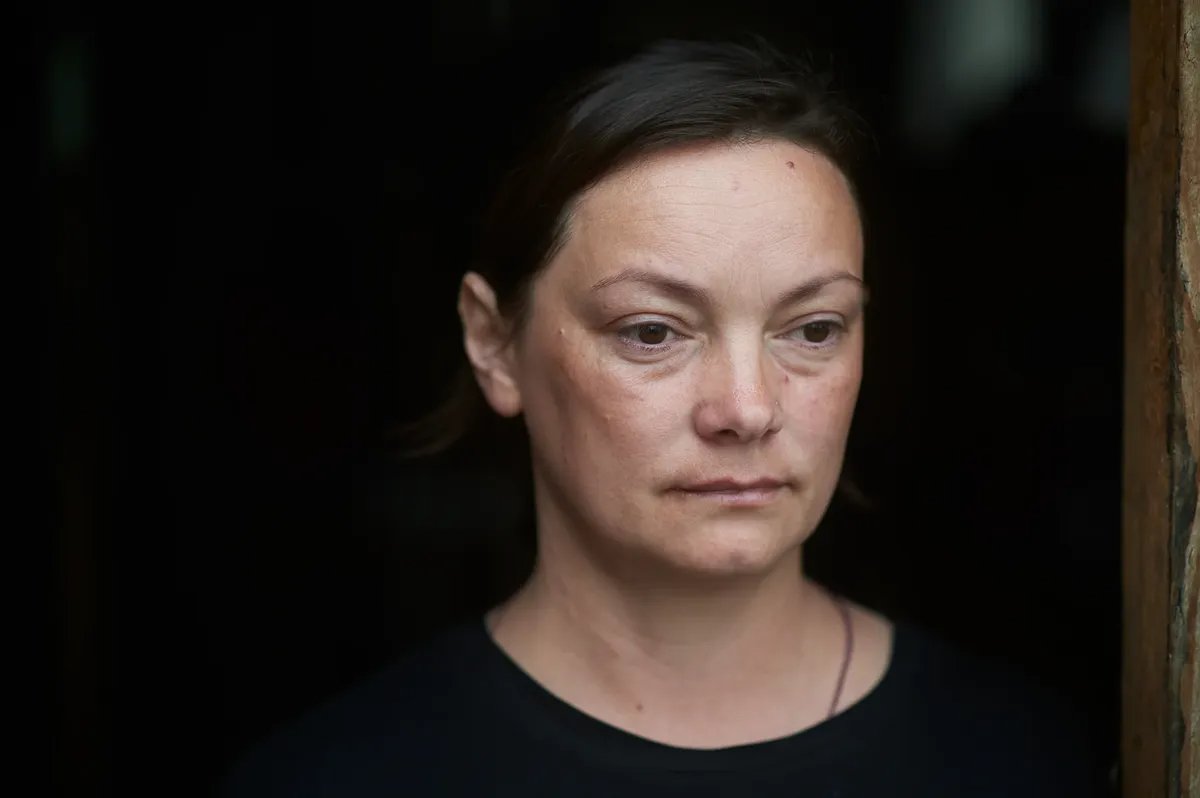
Alexandra Fomintseva
The aforementioned young people, wearing sneakers and track suits, were looking at the coffin with fear while forlornly leaning against the wall, beautifully draped with black cloth. School children, dressed in the Young Army Cadets uniform, that were brought to the funeral from the city were barely hiding their tears, their hands shaking.
“It’s always a tragedy when students that have just graduated die. Andrey was an exceptional student, he never hid behind people’s backs,” said Andrey’s teacher, with a shake in her voice.
“A good example of patriotism. We will consider the possibility of installing a memorial plaque in Andrey’s school,” added a Ministry of Enlightenment representative.
Four minutes
“On the day I gave birth to Andrey, there was a lot of snow,” says Alexandra Fomintseva, Andrey’s mother. “On 13 April, snow storms in the Urals aren’t rare. I was 17. The foetus was big, the delivery was very complicated. When Andrusha was born, he wasn’t breathing. He was taken from me immediately. I was crying, asking the doctors to save my son. I was told that he would probably not make it, but if he did, it would be only due to luck.
He wasn’t breathing for almost four minutes, but then a miracle happened — he took his first breath. Two days later, my son was given back to me.”
Andrey was an easy child. At two years old, he went to kindergarten. Andrey’s mum went to university, she had exams to pass, meanwhile his grandma had work. The baby could not be watched by the husband — he was “unreliable”. After her exams, Alexandra went to work in a penal colony — at first, she worked in human resources, then spent many years in the security office, ahead of her retirement (Russia's Federal Penitentiary Service employees retire at a younger age than the average — translator’s note) she was promoted to the operations centre. The job was hard: constant alarms, working overtime, business trips… The grandmother helped.
Later, Andrey’s parents got divorced. His father went to live in the North, his mother remarried, and gave birth to a second son. His mother and her new husband used the maternity capital programme to buy a one-bedroom flat in Vsesvyatskaya. Andrey stayed with his grandma — her flat was bigger.
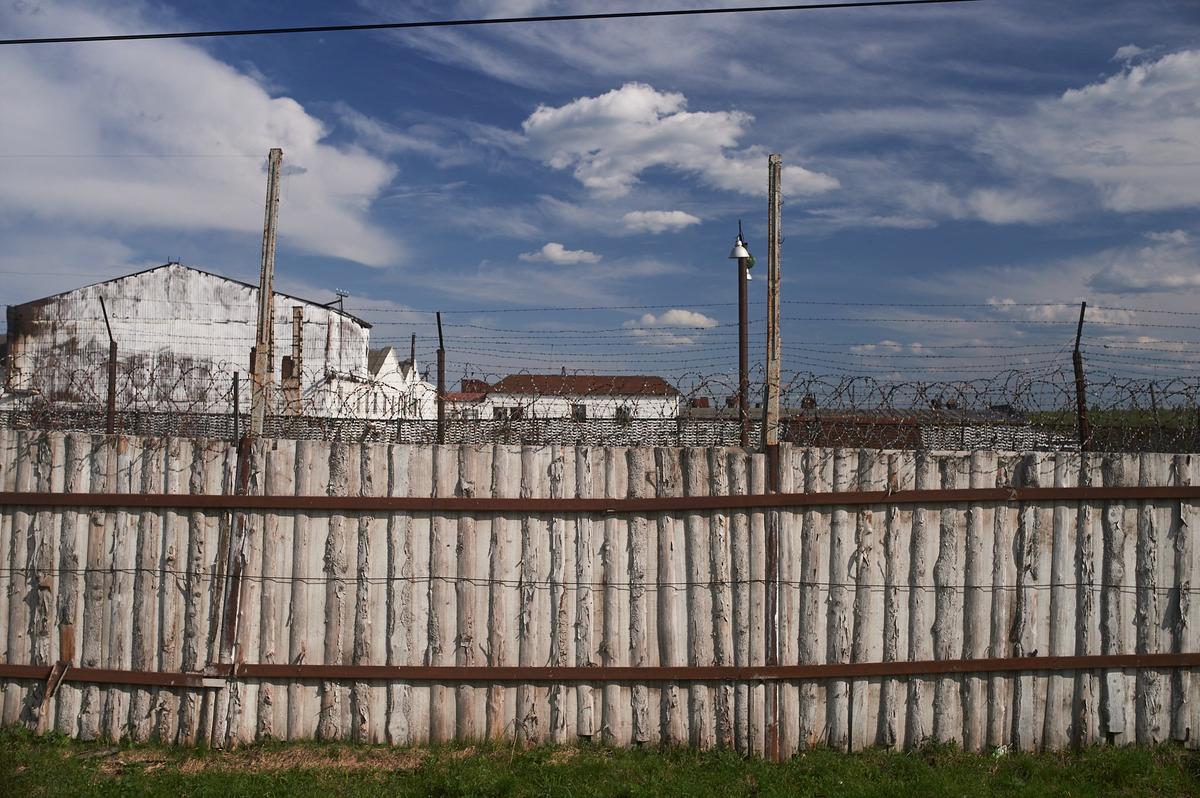
Correctional Facility №10 in the village Vsesvyatskaya
“He had a good relationship with his father”, says Alexandra. “I never tried to turn Andrey against him, I always supported them having a relationship. My ex-husband never paid alimony, but his mother, back when she was alive, always gave Andrey a little money from her pension. For two summers in a row, Andrey went to work with his father, he wasn’t slagging off during the summer holidays. His father worked as a plumber and installed communication services into residential buildings; Andrey helped him. During the first summer, when he was 15, by helping his father he earned enough money to buy a used motorbike. It cost 10,000 rubles (€183). My baby loved to ride it. By the next summer, he had sold the bike, earned more money by helping his father, and bought himself a used car”.
The bus stop
The village Vsesvyatskaya, where Fomintsev lived, stands on a twisty dirt road close to a forest. All around, there are black, sagging little houses with broken windows, worn out roofs, fences steeped deep into dirt. It feels like a scene from the horror movie Wrong Turn.
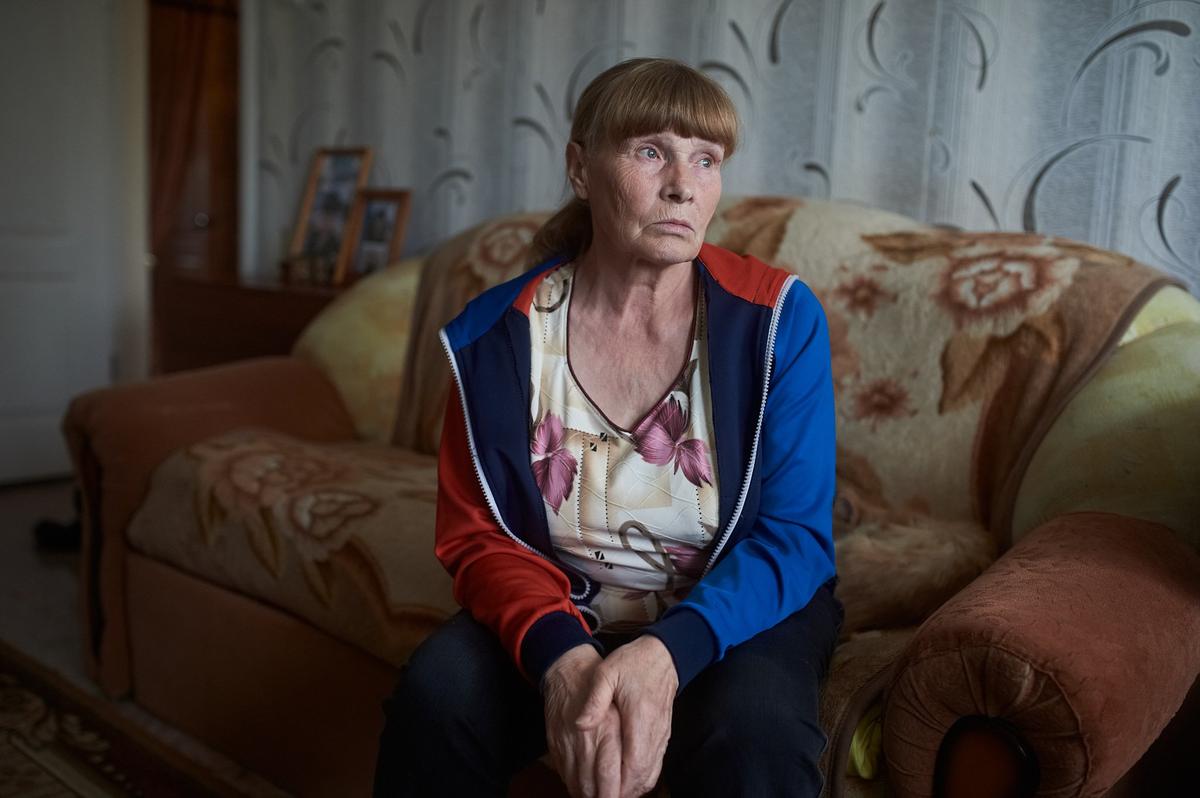
Andrey's grandma Tatiana, in his room. She was born in the Kirov region, married a military man. After his retirement from the army, they went back to his hometown of Kungur, in the Perm region. He went to work for the Federal Penitentiary Service. They were stationed to the village Vsesvyatskaya
The village was first a railway station, founded at the end of the 19th century. In the 1930s, prisons and Gulag colonies were opened in the region. The village was populated with victims of forced settlements, ex-kulaks (the name of wealthy peasants during the first USSR years — translator’s note), and Soviet Germans. In 2010, the village’s population counted about 3,000 people; in 2022, there is barely 1,000. There are 14 houses with 22 flats each.
The old village and the new centre established near the penal colony №10 (these two together make up Vsesvyatskaya) are divided by a railroad. Time seems to have stopped during the 90s down here. The only additions to the village since that period are: there is dust everywhere, and there is more rust. There are three penal colonies in the district, the entire village works “behind the barbed wire”. After 5 pm, the street gets filled with men in uniform — the prison guards finish their work day. They rush to get to the store, and after a few minutes, several of them are already not steady on their feet.
The centre of life in Vsesvyatskaya is a bus stop. There are children sitting there. They are discussing a motorbike that a 15-year-old boy drove here. Not letting the bike move, he keeps pressing the start button — clouds of smoke and the joy on children’s faces appear at the same time. Towards the evening, the station gets filled with older kids. The store nearby keeps the youngsters engaged. Girls walk down the street. First, they go one way, then the other. There is nothing else to do in the village. Back during her childhood, Alexandra also sat at this station. Later, so did her son Andrey.
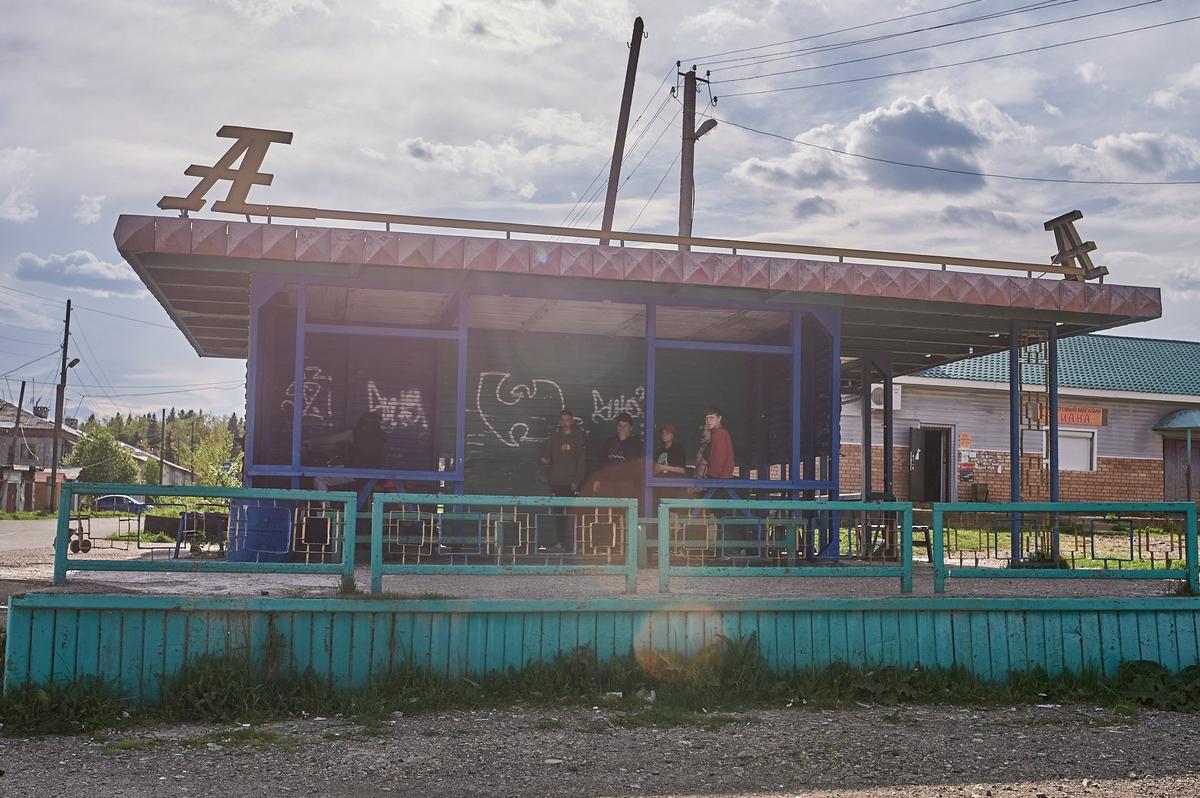
The bus stop. Hangout place for young people
Grandma
Andrey’s grandma Tatiana Utemova is a slim attractive woman over 70. She is wearing jeans and a sweatshirt — it belongs to her grandson, who will not need it anymore.
“Andrukha was persistent,” she remembers. “If he started on something, he would not stop until the thing had been finished. In primary school, he was a straight As student, later on, he started getting Cs. He lived with me since the age of 10”.
Andrey’s room has not changed since he was here last, during his last leave. Bed, drawer, table, computer… At the table, Andrey’s younger brother David is playing Lego. There are a lot of pictures on the walls — mostly, Andrey’s portraits at different ages, going back to kindergarten. Almost all of them are of Andrey in a military uniform.
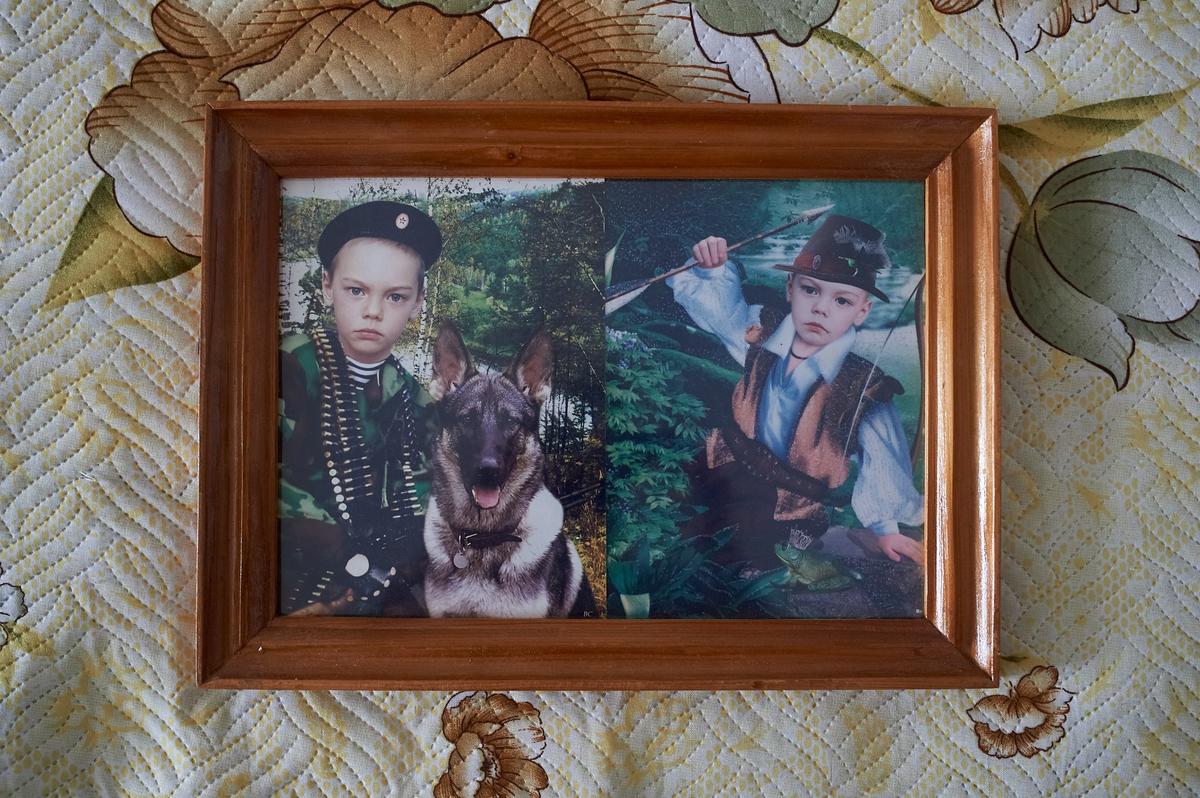
Andrey's childhood photos
“He was a big patriot, so am I,” notes Tatiana. “What does that entail? I love patriotic songs a lot. Even while putting my grandson to sleep when he was a baby, I would sing Song about Shchors (a famous Soviet song — translator’s note) to him”.
There are no books in the room. Andrey’s grandma admits that he did not love to read. Would try to get out of reading. She remembers telling him: “Did you memorise your lessons? Retell them to me.” Andrey answered: “Grandma, you should read the books first yourself. How can you check my answers, if you don’t know what they say? Only, I need you to read out loud.”
The TV in Utemova’s flat is never off. Especially since the start of the special operation. The second Tatiana wakes up in the morning, she turns the TV on.
She says that since 24 February, she is basically unable to sleep, she watches all the news possible — “the worry is unbearable”.
There is a primary school in the village, with each class having no more than 10 students. After ninth grade, Fomintsev moved to the district centre, the town of Chusovoy, to become an electrician, and started living in the technical college dorm. He began to see his grandma less often. Then he started dating a girl from college, gave up on his studies, and found a job — he became a loader in a supermarket.
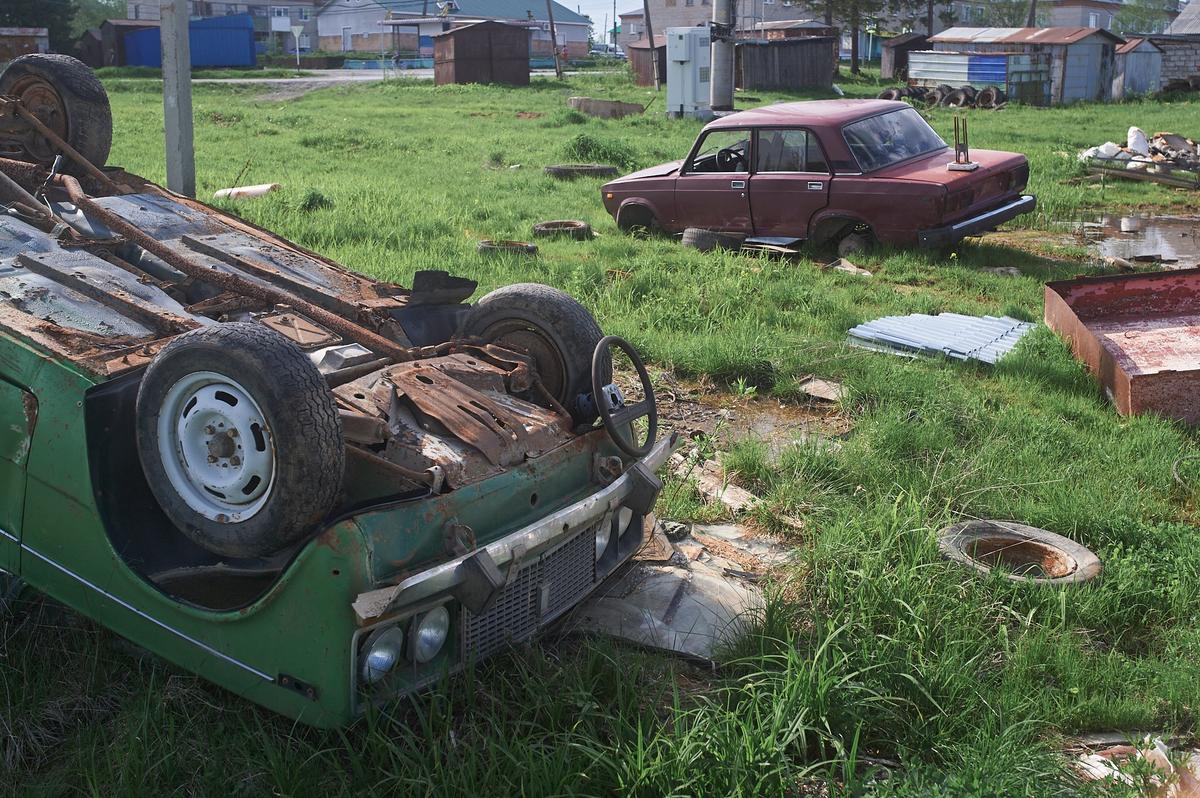
Landfill at the exit from the village Vsesvyatskaya
“He saw us way less. Sometimes, I’d have to go there, try to find him through his friends, just to make sure he’s alive. He wouldn’t always answer my calls. Now, I wonder if God was preparing me for saying goodbye to my son,” says Andrey’s mum.
“He really loved computers,” says his grandma. “But he went to a Chusovoy college, as it was closer to home. Maybe, if he had chosen a profession he liked, his life would have gone differently. He’d be studying and not in a hurry to join the army.”
The army
“In the autumn of 2020, he said that his college mates were joining the army, and so was he,” remembers Tatiana. “At the end of November 2020, he joined the army as a conscript, and by 10 February he had signed a contract. At the supermarket, he earned 18,000 rubles (€329) a month. As an army contractor, 24,000 rubles (€439). He said he liked military service. He and his friends rented a flat, and every day they would go to the military unit. Only, the bus didn’t go there, so they had to chip in on the taxi — Andrey didn’t like that.”
According to his mum, the army was not Andrey’s first choice but the prospect of serving did not bother him. His childhood friend Sasha was taken to the army the day before Andrey. Andrey went to see him off, and then went himself. On the first day of service, he called his mother from the distribution centre and happily told her that he was already “bought” for the Belgorod region. Alexandra got scared, seeing as the region had a border with Ukraine, but her son calmed her down, saying that nothing was happening there. He was appointed to a recently built military unit.
“As a woman in uniform, I was very worried about him,” confesses Alexandra. “I understood that anything could happen over there. The army is the same as prison. In December, he got into trouble. He stopped using his number to call and text, once in three days he would use different numbers to text “I’m good”. We had a code word.
Before he left for the army, I told him that if it all ever got too much, and he felt on edge, he should text me “Everything is great”. On the night of 16 December, I got a text message: “Mum, everything is great. Don’t text this number.”
In the morning, I read the message and started shaking. Immediately, I started to search for contacts of people who could help. I wrote to the Committee of Soldiers’ Mothers, asking for help and explaining that my son had used the code word.
The human rights defenders appealed to the unit’s political officer, saying that the mum was just worried that her son was not contacting her. The officer called Alexandra, with Andrey next to him. He gave him the phone and Andrey told her that he was doing good. What else could he say, standing near his commanding officer? But later the same day, he called his mum again and told her that he was “being pressured” by the Dagestani soldiers. They would pull on his cross so much that the leather string he used to wear it on his neck tore. They threw away his cross.
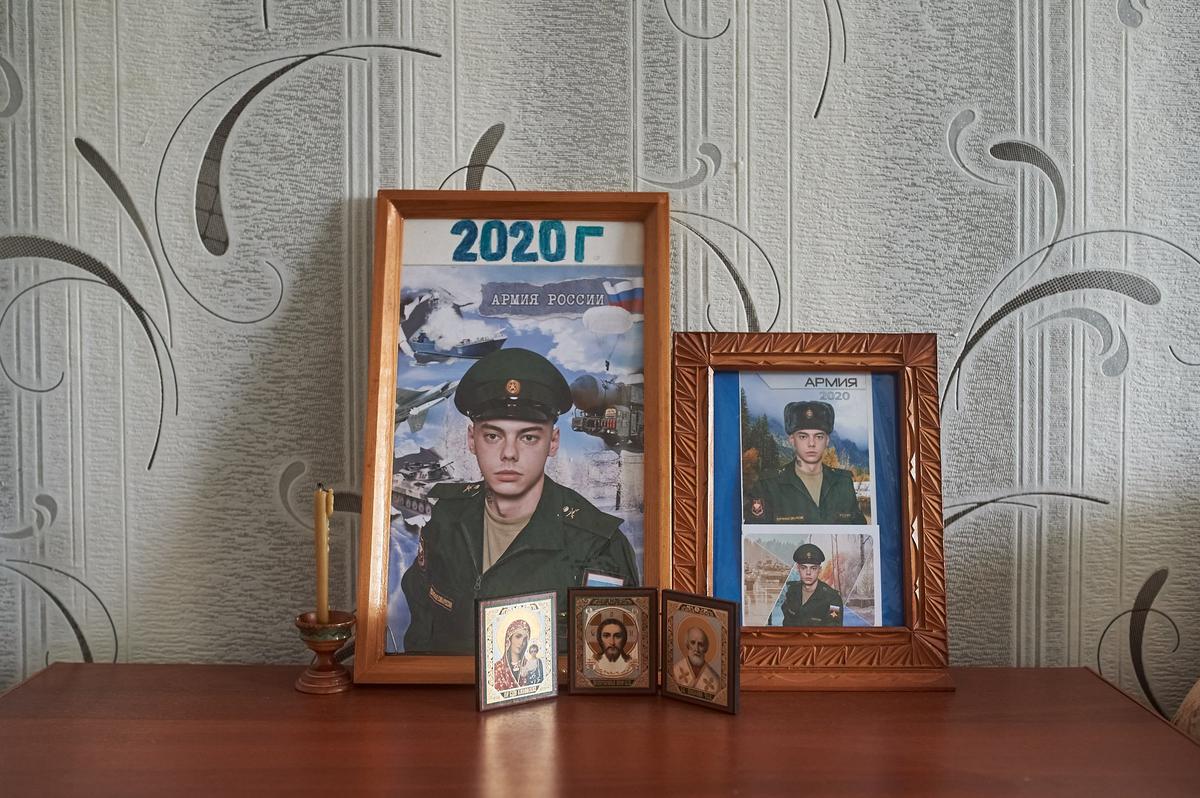
Army photos in Andrey`s room at his grandmother's house
“I asked him whether the officer helped him in any way. He said yes,” continues Alexandra. “He explained that the officer told everyone that Andrey was a general’s grandson. Oddly enough, but the lie worked on the bullies.”
Later, Andrey announced he was applying for a contract, and his mother grew even more worried. Of course, she told him that it was his choice, and his family would accept it either way. But she did also tell him that he could still change his mind.
“But he wanted to sign the contract,” says Andrey’s mum. “He had nine grades under his belt; there is no work around here. I didn’t insist on my point of view, didn’t impose my reading of the situation on him… Maybe, I should have. It was the same as with his studies. When he stopped going to his college classes, I went there and convinced them not to expel him. Then, I asked him directly: “Do you want to keep going here?” He said no. I had to pick up his documents due to him still being a minor. I gave him the opportunity to live independently”.
“I never asked him to break the contract,” is his grandma’s outlook on the situation. “How could I? He swore an oath. He gave his word, so, that’s it, he has to follow orders. And how could he live with himself otherwise? Someone dies, while you’ve [run away], breaking the contract. What did my grandson die for? It hurts that he died because of those Ukrainians. For eight years, they endured. And now what? Look at the latest news about the ‘Azovstal fighters’. They got them out, the wounded were at once sent to the hospital, put under doctors’ care. So, why did my grandson die and no one was there to help him? Why are they sending these boys over there? This isn’t a war. This is a special operation, and in this case it’s better to send professional soldiers there, someone with combat experience. I found out at some point that he got an “F” in shooting. I asked him: “Andrusha, how did that happen?” He replied: “Granny, my gun doesn’t even have iron sights.”
Ukraine
“Late at night on 22 February, I watched the president’s speech on the recognition of the “LDPR”, then I cried for three hours,” remembers the deceased’s mother. “I understood at once — this means war. My youngest was calming me down, saying: “Mummy, don’t cry.” Not long before, Andrey told me that if Putin recognised the republics, that meant that the army would cross the Ukrainian border. I got so scared for my son; I realised that they would send contract servicemen there. And he, of course, was also scared, but he wouldn’t show me. But I always knew what he felt…”
Shortly before midnight on 23 February, Andrey called and said that they were on their way, already with one foot in Ukraine.
“In December of last year, Andrey quit smoking,” continues his mother. “Meanwhile a few hours before crossing the border, all of them got unexpectedly given out a pack of cigarettes each. That’s when the guys in the unit understood what was happening. You know, in the past they would pour a shot of vodka before combat, now, they give out cigarettes.
On 24 February, Alexandra woke up and started looking for her phone at once. There were no messages from Andrey. Normally, they would text each other every morning. Andrey’s mum waited. The next day, she texted his girlfriend, asking if there was any news. She replied saying she had only got one message: “I’m alive. We are in Ukraine. We captured a checkpoint.”
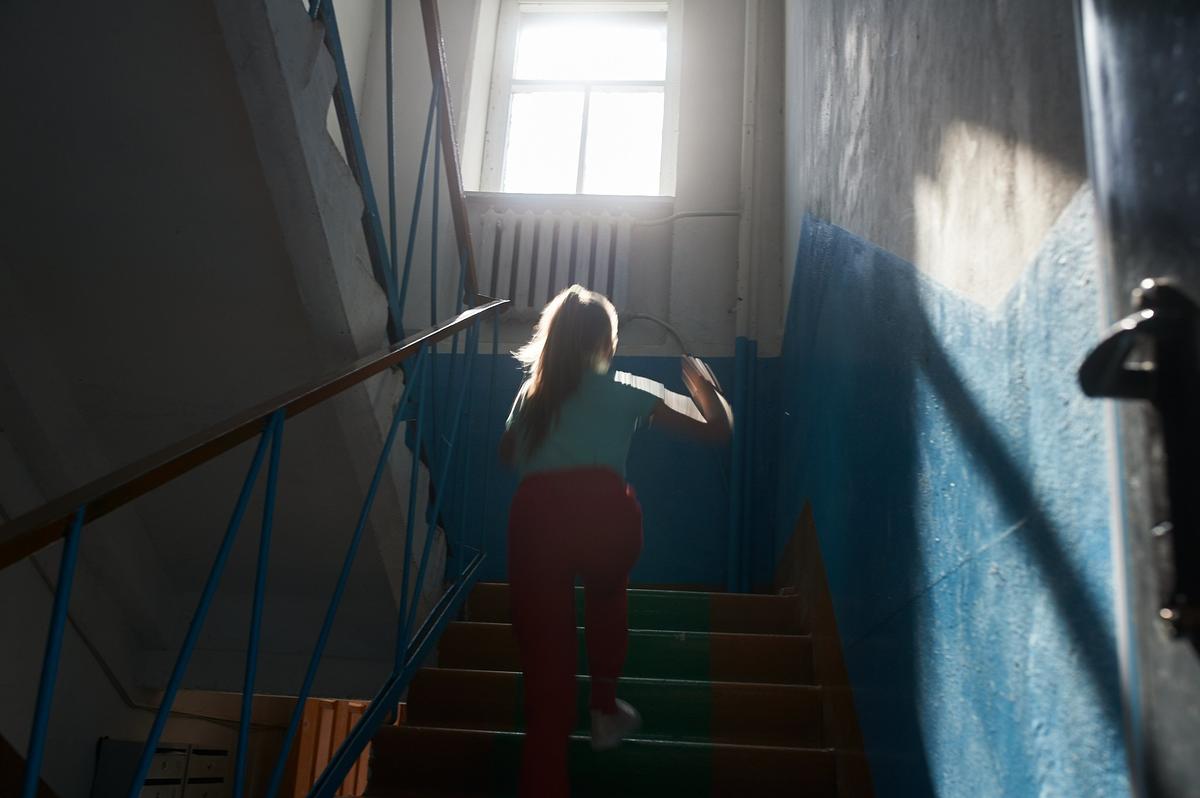
The house where Andrey lived
“Next time he called was on 8 March, from someone else’s number, the identification code was of the Rostov region,” recalls Alexandra. “He wished me a happy Women’s day, and I couldn’t get a hold of myself — started crying. He got upset, saying that he shouldn’t have called…
Meanwhile, I spent those two weeks without any contact from him or any coherent information from his commanders. By that point, I had already gone to psychics. They told me that Andrey was alive and well, and that he would come back home.
He also called me the next day and the day after that.”
The last time she spoke to him was on 21 March. It was a normal conversation, like, yes, everything is well. But Alexandra also heard an unusual story — one of the soldiers shot himself in the hand, and he was released. Alexandra was astonished: why? He could have got to the bone, become disabled. At first, she thought that he had shot himself by accident but Andrey told her that he had done it on purpose.
“Why didn’t I tell him to do the same?” she cries. “I only said to pray. He replied: “Mum, I don’t have time to pray. I don’t even have time to sleep.” I told him not to take anything from the locals. He said that they themselves were sharing their rations with the locals. One other thing, he once told me that a lot of people had fled the village and the soldiers were catching the remaining chickens, making soup.”
“Do your legs get cold?”
“No. Do you think that’s important right now?”
“Have you seen dead bodies?”
“Yes, mum.”
Death
“On the night of 27 March, I woke up at about 5 am”, recalls Andrey’s mum. “During my prayers, I have always said: “O Lord Jesus Christ, save and protect my son…” That time, I caught myself saying the prayer a little differently: “save and protect my novoprestavlenny (a religious word which means “newly departed” in Russian — translator’s note) son.” Back then, I didn’t even know that word. I learned it only after I had been officially told about Andrey’s death; I bought a special prayer book where I read that during 40 days after death, the deceased is considered to be novoprestavlenny. Anyway, that night, I stumbled on that word, corrected myself and continued my usual prayer. But I couldn’t stop worrying. Spent every free minute praying. Even at work. The second I was alone, I fell to my knees and prayed for my son. During that last week, I even stopped speaking with my colleagues. I was always in my thoughts asking God to keep my son safe. I had a bad feeling, but I kept praying: “Lord, let him be crippled or blinded — just bring him back to me.” I believed in the power of a mother’s prayer, that it would protect my son.”
On 4 April, Alexandra was at work. Closer to 4 pm, Andrey’s girlfriend texted her. She forwarded her a message exchange with her friend that lived in Valuyki, a town in the Belgorod region (where the military unit is located), and knew Andrey and his fellow soldiers. The friend wrote that Andrey had died — he and the other soldiers had been hit during shelling. Fomintsev managed to jump out of an APC but he got injured: either in the arm or leg. He was left there, the other soldiers could not carry him. According to the text messages, they returned for his body only in the morning; Andrey managed to crawl a few metres away from the hit APC but died from blood loss.
Fomintsev’s friends’ version of events differs from the official one. Since then, his mum still does not know what to believe. She keeps trying to discover the truth, she has found almost every soldier that was near Andrey during the shelling that day.
Later, Alexandra met with Andrey’s commander. He was given 10 days of leave, and they accidentally bumped into each other at a store. She says the commander went pale when he saw her.
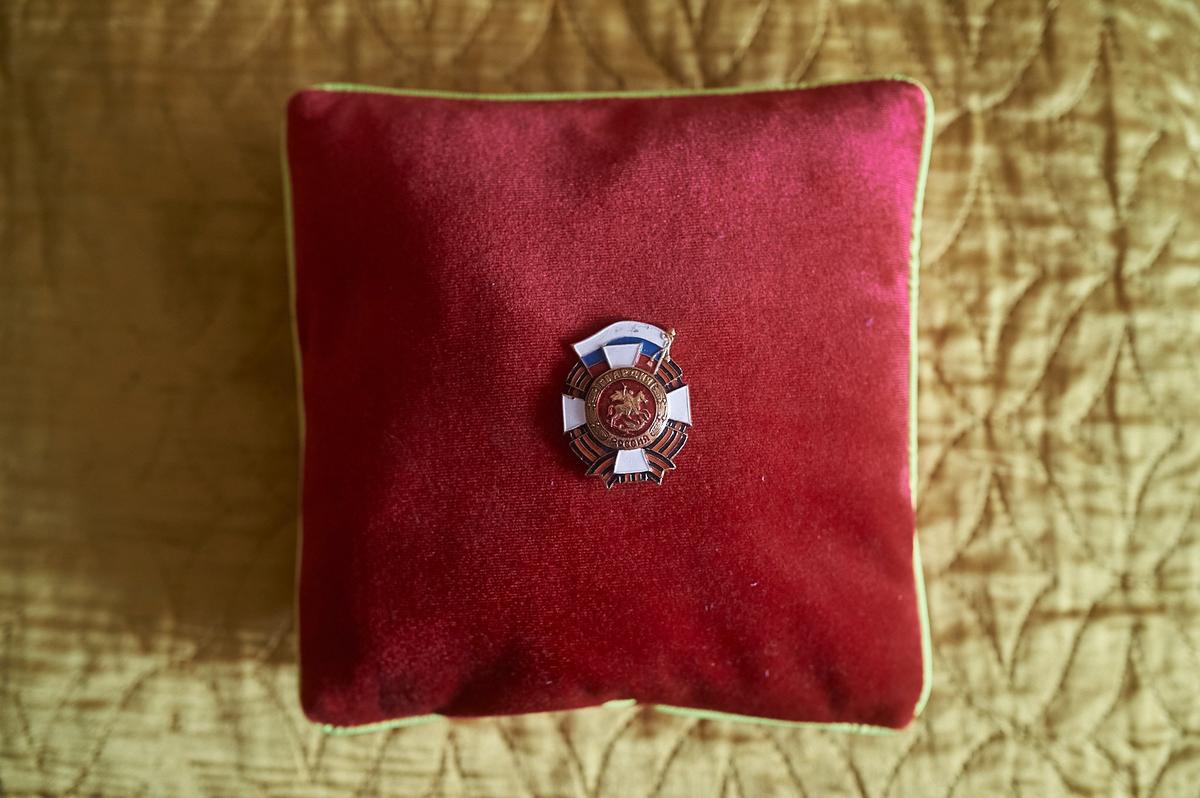
Guards badge, awarded after death
“They just left him to die,” cries Andrey’s mum. “He took off the bulletproof vest and abandoned his gun, he kept crawling until he bled to death. Nobody helped him. They went to get him only the next morning. I guess, I should be thankful they got his body and brought it to me. I’ve got his grave, that’s my only reason left to live. Although I can’t visit the cemetery, I just can’t…”
The military office informed the mother of Andrey’s death on 5 April. The official version is a wound to the stomach, incompatible with life, they say he died instantly. The body was delivered on 8 April. An officer said that the coffin lined with zinc was not sealed, the private was in good condition, he had not been blown up or set on fire. “Do you want to see the body?” “Yes.” The parents moved the boards and found the coffin sealed.
“For a moment, I started to have doubts, maybe they mixed up the coffins,” confesses Alexandra. “I had people waiting nearby, mum, dad, and others. To open up a coffin, you have to cut it with a circular saw. We thought about it with Andrey’s dad and decided not to open it. The coffin stood at the village community centre. That night, when everyone had left, I remained there alone. Walked around, talked to my son. At dawn, I told my husband: “Let’s open it up.” I didn’t have any more doubts that it was Andrey in the coffin. His things were returned to me. But how do you say goodbye through a coffin lined with zinc?..
We took a can opener, then used it to make a little window in the coffin. There was no smell, the colour of his skin was the same as always. As if he were asleep. Only his mouth was skewed, as if it was frozen mid-scream. My son was in pain, dying, screaming, calling for help.”
Money
After the death of private Fomintsev, his family got three compensations. The “Putin” one — 5 million rubles (€91,507), soldier’s insurance — 1.4 million (€25,622), and another Defence Ministry insurance — 4.2 million (€76,866). They are also expected to receive an additional, regional payment — 1 million (€18,301). All the sums are to be equally divided between Andrey’s parents.
“I was told I could sue, seeing as my ex-husband has never once paid alimony, so he doesn’t have the right to these payments,” says Alexandra. “But I don’t want to. Andrey loved his parents and wanted to help both of us.”
Andrey’s father does not have any other children. Andrey was his only child. The money was used to buy a two-room flat for 1.4 million rubles in Chusovoy and a dacha. Andrey’s mother and step-father, both ex-employees of the penal colony, retired. Alexandra now spends her time on her youngest child, trying to compensate for all the communication she did not give or receive with her oldest. Her husband now works at a store. To commute from the village to Chusovoy for work would mean spending 300 rubles (€5.49) every day, so they decided to move to the town. They are also planning to take the grandma from the village too.
“Before handing in my notice, I earned about 40,000 rubles (€732), in the previous years my salary was 20,000-28,000 rubles (€366-512) a month,” says Alexandra. “But we had loans. A few years ago, we bought a flat in the village using the maternity capital. It needed repairs and was completely empty: no dishes, no furniture, no appliances. Now, we will move to the town.”
“David will study better in the town, children and teenagers have nothing to do in the village,” says Andrey’s grandma. “In the evenings, they stand at the bus stop and drink beer. Yesterday, I saw Sasha, Andrey’s childhood friend. He’s a year older, he also was in a war zone when serving. We talked.”
“Granny Tania, how are you?”
“I’m okay. And you? Haven’t seen you in a while.”
“I’m drinking a lot.”
“Sasha, you now have to live for both yourself and Andrey instead of drinking.”
He agreed, then continued to drink. He does not work anywhere after coming back from the army, he lives with his grandma.
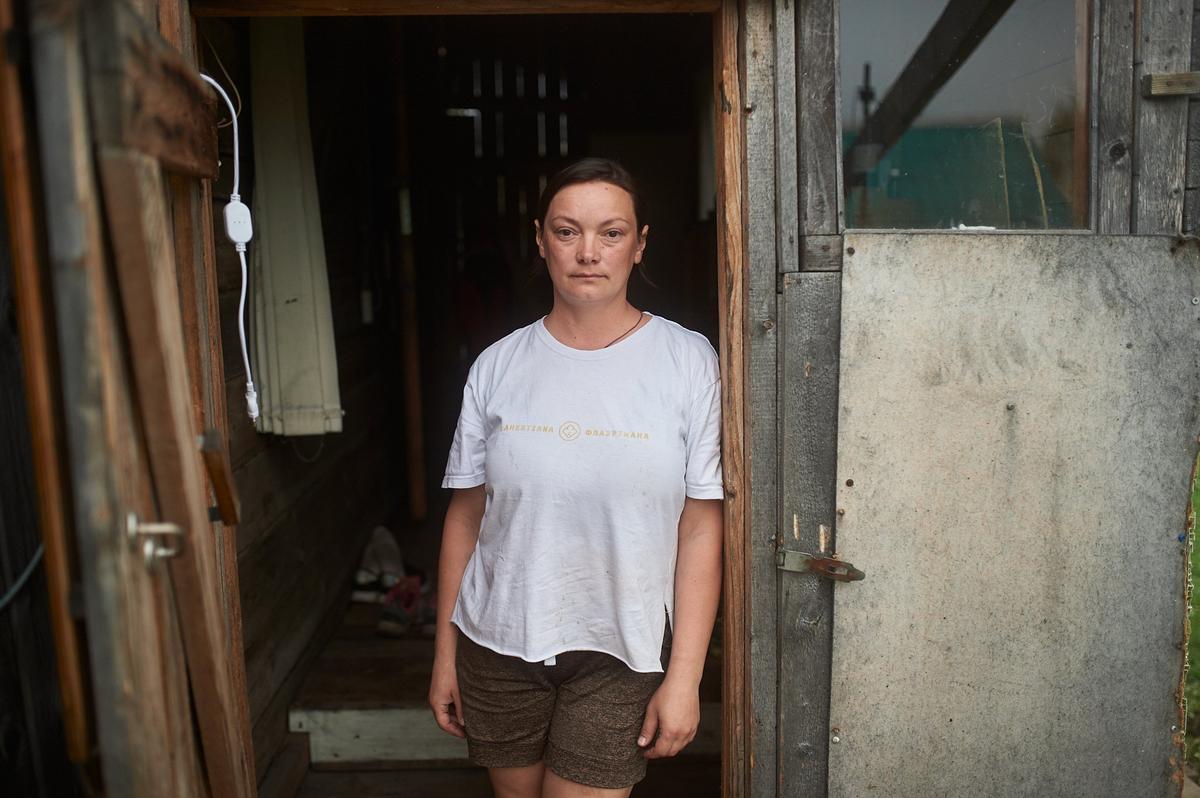
Alexandra, Andrey's mother
Andrey Fomintsev was awarded an Order of Courage posthumously. According to Alexandra, it gets awarded to everyone killed during the special operation. This order does not grant any benefits, it does not mean anything at all. There is one other benefit: today, all the participants of the special operation are equated to veterans, so Alexandra has received the title of a veteran’s family member — she will get a utility bill reduction, be able to retire five years earlier (but Fomintseva is already retired), and receive regional payments. The payment is around 10,000 rubles (€183) a month (the exact amount depends on the region), if one family member applies, if more do — the amount is divided between them.
A flat in Vsesvyatskaya costs around 100,000-300,000 rubles (€1,830-5,490). The entire village counts 308 flats, the approximate cost of all of them together is from 30.8 to 92.4 million rubles (€563,685-1,691,053). The entire village Vsesvyatskaya costs the same as two thirds of a T-90 tank or eight infantry mobility vehicles Tigr.
Cemetery
“All the funeral expenses were paid by the military office, we only bought vodka,” says Andrey’s grandma. “I don’t know why but apparently you can’t include alcohol on the official expenses.”
We went down to the village cemetery: a big number of graves, chaotically placed in between the trees in the forest. Andrey’s grave is visible at once — it has a lot of artificial flowers and wreaths on it. Someone put two plastic figures of a double-headed eagle, painted golden, on one of the wreaths. Inside, the eagles are hollow, the stamp says Made in China.
“Andrey was supposed to finish school, then the army, work for a year, and then he would get married,” says his grandmother. “I was waiting for my great grandchildren, then I could die in peace. Now what? I work in the garden and cry, I eat and cry, I watch TV and cry. I keep waiting for the door to open and for Andrey to yell out: “Granny, I’m home!”
After 40 days since Andrey’s death have passed, his mum stopped sleeping. She says that when everyone falls asleep, she cries into her pillow, wailing. She keeps realising that her son will never come home.
Until the 40th day, she was in denial, she refused to go to the cemetery. She constantly swallowed pills, then realised that that was not healthy, it was time to go back to reality. She stopped taking antidepressants, and things got even worse. Now, she is constantly being monitored by a psychologist provided by the government.
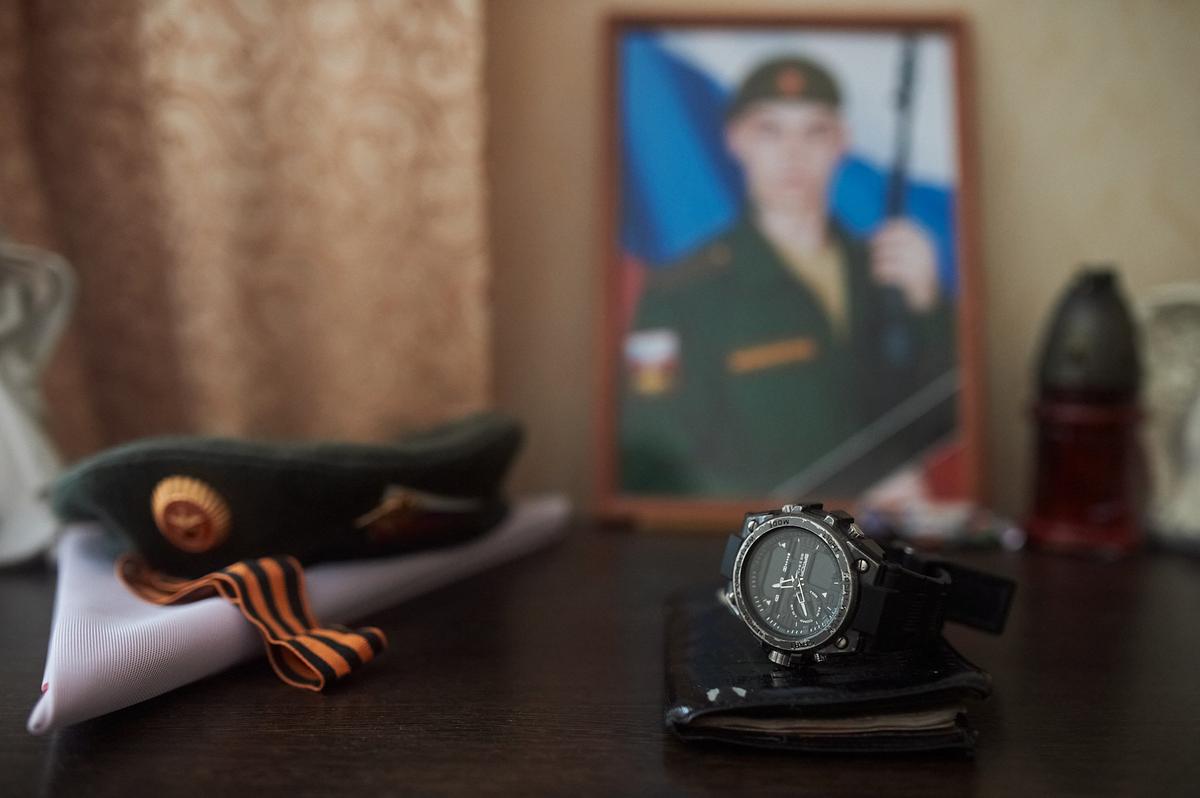
Andrey's watch, which was on him at the time of death
“My son’s watch, which he was wearing at the moment of death, beeps every hour, at 6 am the alarm starts going off quietly. I can’t sleep until that moment. I lie awake and listen to the quiet beep every hour. I fall asleep after the alarm starts. This time I dreamed that I’m holding his bloody jacket in my arms, his civilian one for some reason. I am walking around a big room, looking into every door, and calling for my son. I enter a big gym: “Andrey! Andrey!” And suddenly a ball rolls towards me. I kick it, it rolls back to me. And I realise: that’s my son, he wants to play. So, we play for some time, but I can’t see him. Suddenly, the ball froze. Silence. I thought, good, my son gave me a sign. I walk out of the gym — Andrey is there, in the corridor, sitting on a bench.
“My boy,” I whisper.
“Mum, stop calling me. Every time, you pull me down from heaven. It hurts so much.”
And he let me feel what he feels — it’s as if thousands of needles went through your body.
“We are all alive up there, mum, we feel pain.”
“Do you miss us?”
“Duh.”
We hugged. I kiss him and kiss him: his face, his cheeks… I feel his body, as if it were real. One second — and he’s gone from my hands. Woke up. Realised that it’s time I stopped calling for him. Let it be this weird way, but at least we said goodbye,” concludes Alexandra.
****
Alexandra’s youngest was also greatly influenced by his brother’s death. Lately, he has been barely paying attention in school, disrupting lessons — during a class he would start to cry. He will soon start seeing a psychologist.
Alexandra finds something to do from morning to night — anything not to have to think.
“He was a kind boy,” she sighs. “You know, there are men that long for war. Andrey didn’t want to go to war, it wasn’t his calling. For me, as a mother, this is plain murder. On the other side, there are also someone’s children dying. I have stopped watching the news. When you know the situation this personally, the news isn’t longer convincing. I keep thinking: what did my son’s death save him from? Maybe, from committing a hideous crime? Or from getting captured and tortured?
“I didn’t think much about the special operation, didn’t give it any assessment. But now I understand that this is a war, people are dying… What is it all for?.. They say it’s for prevention, so no one attacks us, so there are no more laboratories, that fascism has been there for so many years already. Well, if everything was this awful, why didn’t you start this operation sooner? Why did you wait for all these threats to become so big? And another thing: if we feared Ukrainians attacking us, we should have let them — defence is always more advantageous than attack. And our army would be stronger, and the rest of the world would be on our side. If, as they say, our intelligence reported that an attack was coming, we should have just prepared a powerful defence — no one would have dared to come at us. And my son would still be alive.”
